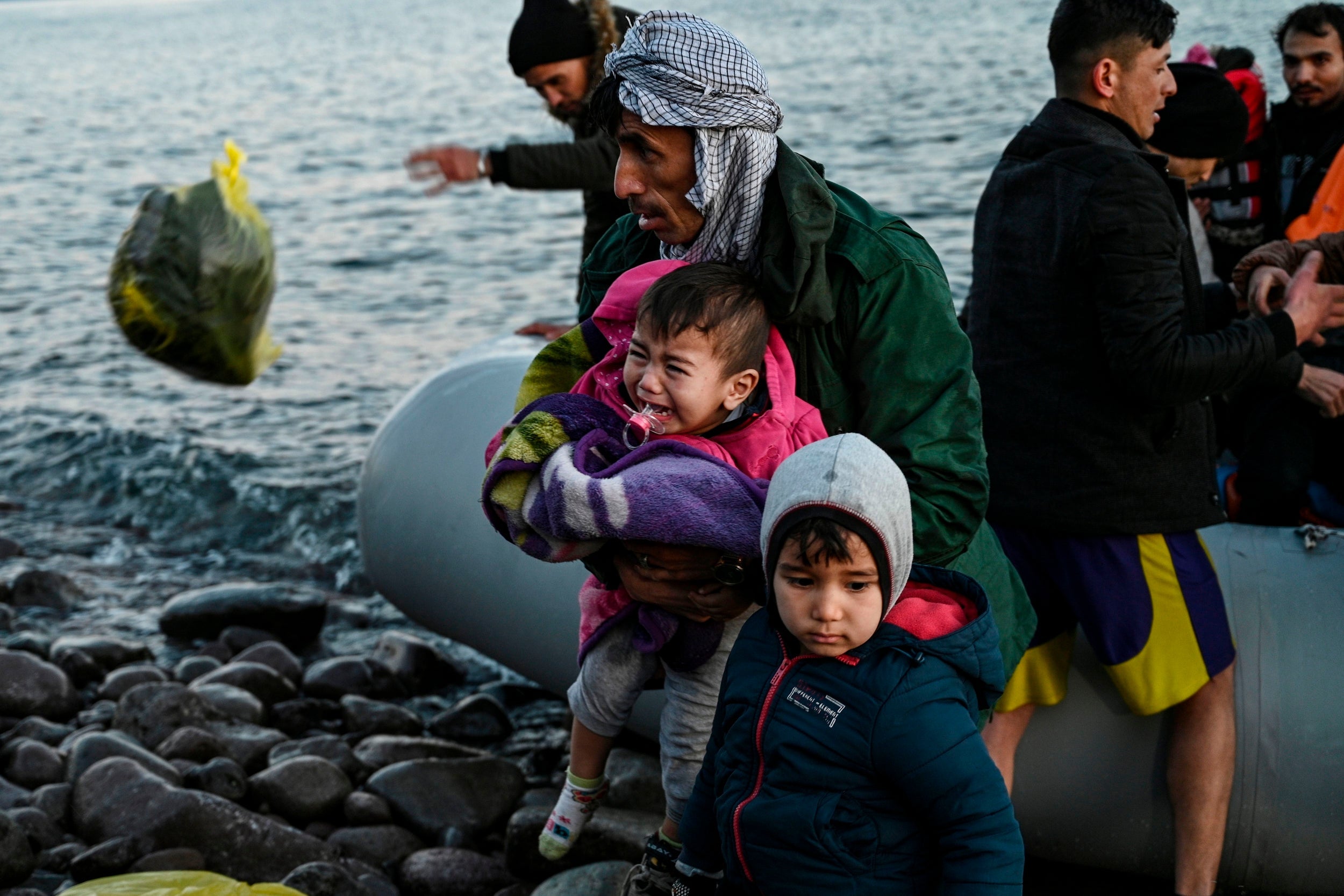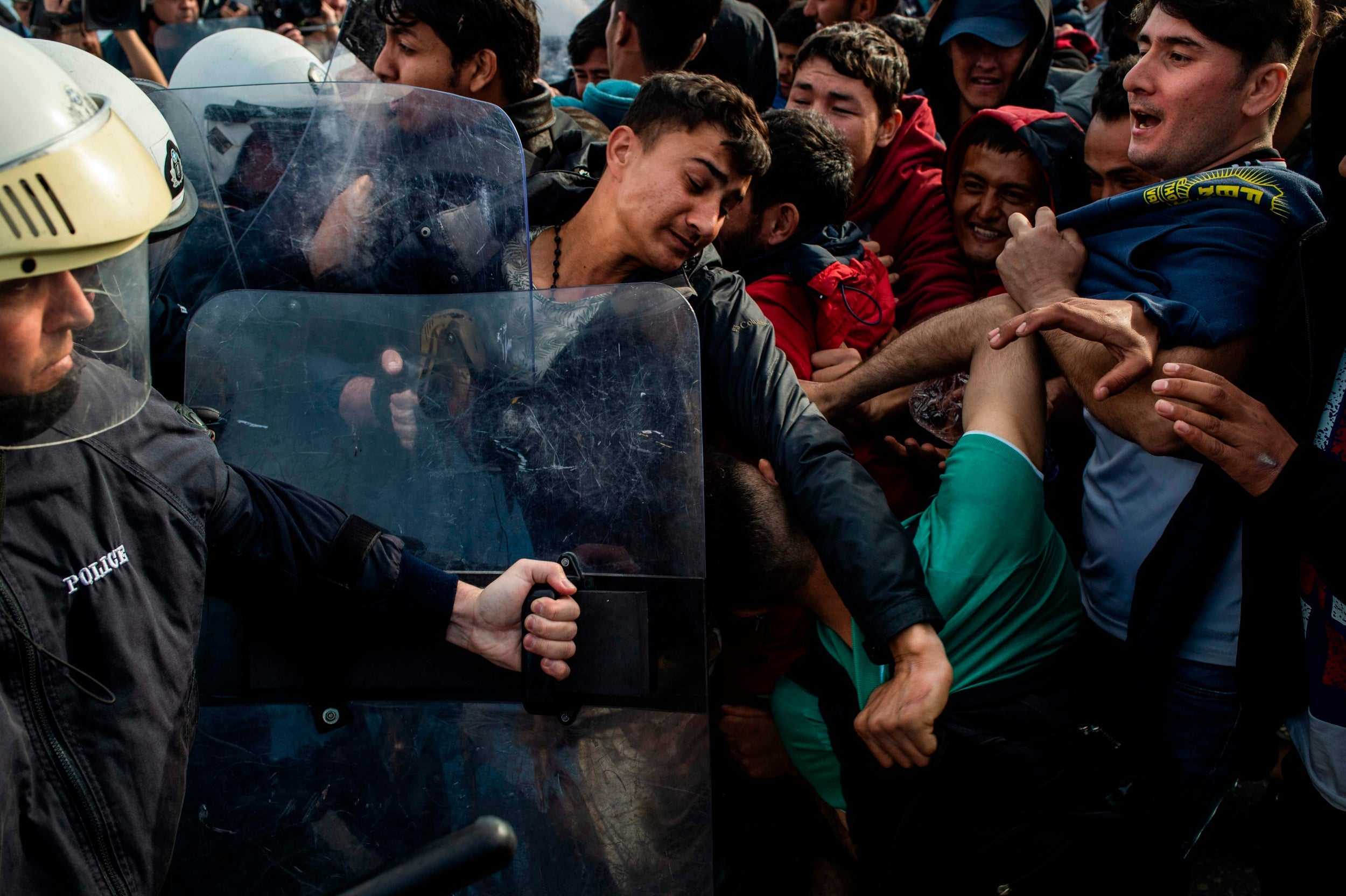Refugees stranded at Europe’s border without food or shelter cling to hope of a better life
Having fled war and persecution, families now find themselves in their most precarious positions yet, reports Borzou Daragahi from Doyran, Turkey


They had been threatened by the never-ending war in Afghanistan’s Ghazni province, subject to bigotry and denied education and healthcare in Iran, and exploited by employers, landlords and smugglers in Turkey.
Now sitting in a muddy field adjacent to the Meric river that abuts the border with Greece and the European Union, the 25 or so members of the Dowlati family are exposed to the cold and wind. They have no money and nor much food. As their children cry, they sit and wait for an opportunity to cross into a European Union that does not want them.
“We heard that the gates of Europe are open,” says Reza Dowlati, a 40-year-old who emerges as a leader of the clan.
Turkish president Recep Tayyip Erdogan’s declaration last week that Ankara was opening the country’s borders to Europe set off a scramble by tens of thousands of the millions of Syrian, Afghan, and other refugees sheltering in Turkey to make a dash for Europe.
But though Turkey’s exits may be open, the European Union’s doors are shut tight. And refugees from war-ravaged countries such as Syria and Afghanistan and as far away as Somalia and the Kashmir region now find themselves stuck in perhaps their most helpless positions yet.
Many blew all their meagre savings on bus tickets to get them to the border from deep inside Turkey, with drivers racking up their prices tenfold.
One family even paid smugglers thousands of dollars to get them across the Syrian border on Friday once they heard of Mr Erdogan’s new policy on television and social media.
“We heard that the border was open and we came,” says Adnan Mosuli, a 22-year-old from Raqqa, who arrived at Doryan with his father and siblings. “It took us two days and $4,500 to get across the border.”
Women and children refugees are especially defenceless. One Turkish couple, spotting the number of small children in the Dowlati clan, gifted them a couple of tents. Some of the nearby townspeople have welcomed women to use their bathrooms. But they still sleep outside.
“There are serious protection risks for women and girls being in an unstable open-air environment,” says Devon Cone, senior advocate at Refugees International. “Even the camps are insecure. What new risks are they facing sitting there at the border?”
The Dowlati family hired a minibus for around £500 to get them from Turkey’s Black Sea city of Samsun to the frontier after Mr Erdogan’s announcement.
They knew from the start it was a long shot. But there are few opportunities for them in Turkey, even for the ones who managed to master the language. There are few jobs, and they pay poorly. Often the employers would refuse to pay refugees their salaries.
The war in Afghanistan had scattered the Dowlatis across the world, some escaping their native Hazarajat in the country’s centre for Iran, others to Pakistan, and still others to Kabul, the capital. One brother made it to Germany, and is hoping to draw the rest there.
It had been a struggle to gather everyone in Samsun, Turkey, and as long as they stayed together as a family perhaps there was a chance they could all find their way to a better life.
The reason we are here is for the children. It’s all so they can have a better life
Besides, says Yunus Dowlati, they had little choice. The 58-year-old had been working as a labourer at a plastics factory in Iran until six months ago. But Iran’s economy had begun to contract under the weight of United States sanctions, inflation had eaten away at his pay, and he wasn’t making enough money to send back to his wife and children.
“I have nowhere else to go,” he says. “I can’t go to Greece. And I have nowhere to go in Turkey. I have lived in Iran for 38 years, Afghanistan is a foreign country to me.”
Once they got to Doyran, they boarded boats and headed towards the Greek side of the river, encouraged, they say, by Turkish officers. Many managed to get the Greek side. Some even stayed on the other side for hours, planning to travel deeper into Europe once night.
But many of the migrants told versions of the same story: once on the Greek side, they were caught by Greek authorities. They were stripped of their belongings and even their clothes and shoelaces. Some were beaten. Some were locked up overnight in squalid detention centres. All were eventually placed on boats and sent back to the Turkish side.

“We were in the woods when the Greek police caught us,” says Ghassem Rezai, an 18-year-old Afghan refugee. “A car came and they took us away. We were held overnight, and they took everything – my money, identification cards, my mobile phone.”
Citing national security concerns, Greece on Sunday suspended its adherence to treaty obligations on refugees, denying any the right to apply for temporary protection. The move has outraged some advocates for refugee rights, but appears to be supported by EU leaders in France and Germany, who have allocated hundreds of millions of dollars in emergency funds to Greece and are planning high-profile visits to show solidarity with the Athens government.
Still, thousands are said to be gathered at the main Greek crossing at Pazarkule, off limits now to journalists. On Tuesday hundreds could be seen walking towards the checkpoint, past the Turkish gendarmerie checkpoint while carrying a few belongings and juice boxes and sesame bread donated to them by charitable groups along the way.
I have nowhere else to go, I can’t go to Greece. And I have nowhere to go in Turkey. I have lived in Iran for 38 years, Afghanistan is a foreign country to me
Among the refugees who tried and failed to cross there was palpable anger and disappointment that their lives were being used as pawns in high-stakes geopolitical games.
“The president who drew us all here should find us some housing,” said Sara Raimi, an 18-year-old Afghan refugee, who gave up her housing and quickly sold off her belongings in the Turkish city of Denizli to come to Doyran. “We’re very angry. He said the border was open. Since he said everything is open, he should find us a home again.”

Still, many of the refugees say they remain hopeful that the borders would open soon. Maybe Angela Merkel would make an announcement. As Turkish television channels film them, a group of perhaps 50 hold a demonstration while facing the Greek side of the river. “Open the border!” they chant. “Open the border!”
Reza Dowlati is more hopeful than angry. He yearns to get to Germany, to join his brother there. His teenage son knows how to work computers, he says, and can find work in the west. He bristles at the suggestion that he and the others have put their children at risk by giving up their precarious but secure lives in eastern Turkey for the perilous journey across the border.
“The reason we are here is for the children,” he says. “It’s all so they can have a better life. I want to go to a more intellectual society. In the name of religion or faith, or in the name of ethnicity and tribe, they cut each other’s heads off. I want to go to Europe because there will be a little more security and a place where my children can study.”
Join our commenting forum
Join thought-provoking conversations, follow other Independent readers and see their replies
Comments